The Edinburgh Interviews: Seven Questions With… Eric Lampaert

© Linda Blacker

© Linda Blacker
The Edinburgh Festival is nearly upon us once again. Thousands of punters and performers are heading their way up to Scotland for anything from a couple of days to a whole month of arts, comedy and entertainment. And once again, MoodyComedy is there in spirit, singing the praises of projects that look particularly innovative and interesting.
But this year is a little different; in order to celebrate the diversity of artists and performers attending the Edinburgh Fringe throughout August, MoodyComedy will be bringing you countless interviews with those risking their emotional, financial and social wellbeing in putting together shows for your entertainment. The Seven Questions With feature is going strong, having already given around sixty comics a platform to share their comedy secrets, darkest confessions and silly musings, and soon we are to see this interview feature at its absolute best, as a means of bringing to your attention acts you may have never heard of before, as well as others who you may already be familiar with.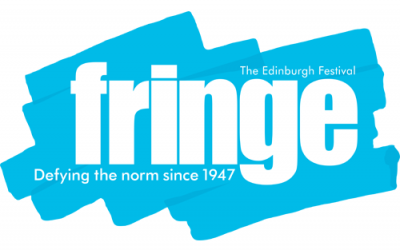 Over the next two weeks, MoodyComedy will be speaking to performers who are making their Edinburgh debuts and those who have been bringing shows to the festival since before I was born, with at least one interview every single day for you to enjoy. There are double acts, character comics, musicians, sketch actors, magicians, television panel show regulars, radio royalty and even the occasional past CBBC presenter. You will experience the flamboyant, the odd, the surprising and the controversial. We have political comedians, absurdist comedians, bilingual comedians. From Glasgow to Dublin, Manchester to Birmingham, France to Canada to Kenya. It’s fair to say that a lot of bases have been covered, with each of these comedians being able to shed insight into the lives of working stand ups, as well as provide many laughs along the way.
Over the next two weeks, MoodyComedy will be speaking to performers who are making their Edinburgh debuts and those who have been bringing shows to the festival since before I was born, with at least one interview every single day for you to enjoy. There are double acts, character comics, musicians, sketch actors, magicians, television panel show regulars, radio royalty and even the occasional past CBBC presenter. You will experience the flamboyant, the odd, the surprising and the controversial. We have political comedians, absurdist comedians, bilingual comedians. From Glasgow to Dublin, Manchester to Birmingham, France to Canada to Kenya. It’s fair to say that a lot of bases have been covered, with each of these comedians being able to shed insight into the lives of working stand ups, as well as provide many laughs along the way.
Stay tuned over the next two weeks to find out which comic practises driving in his mum’s Ford Focus; who has recently taken up cross stitch; who is desperate to be friends with Barack Obama and who has decided he just doesn’t care about anything. Here’s to another fantastic festival of creativity, community and laughter.
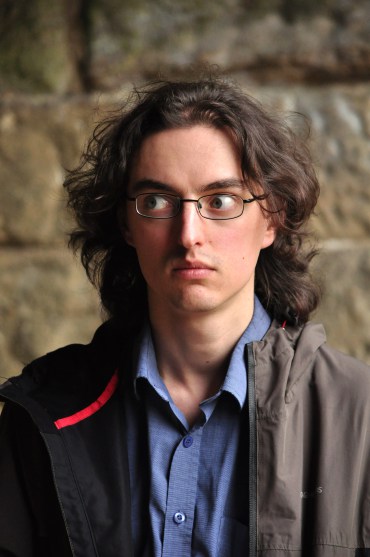
© John Devine
Peter Brush walks onto the stage at MAC in Birmingham to perform a preview of his new show Dreams With Advert Breaks with an air of apology about him. Confident in himself but self-critical, constantly editing, analysing and evaluating. This show is just his second solo hour, but Peter progresses through his material efficiently and chronologically, with a quiet confidence in the content of his show, if not quite the timings at this stage.
Aware of the impression an audience may have of him based on his appearance, as a young-looking, moderately long-haired, spectacle-wearing man, Brush openly shuns the label of ‘nerd’ or ‘geek’, stating that he actually has little interest in things that one might associate with such a trope. The comic explains the premise of his new show, which one could describe as a nostalgic look at childhood, including his past dreams (those that occur whilst asleep and those upon waking).
Brush’s guilty pleasure, it seems, is incorporating the kind of jokes into his sets that induce groans or tuts from an audience. What is refreshing is that he doesn’t care, because he enjoys these quips, and often so do we, or rather we enjoy the satisfaction of a small, rounded-off joke, as a change from longer-form narratives. Peter is aware that silly throwaway remarks are not sufficient to build an entire show and he knows that this is, in turn, not what an audience wants to hear, and in this way the comic shows a proficiency for reading his audience.
The narrative of the hour itself shows promise of being satisfyingly complex, with pleasing callbacks towards the end of the hour that bridge the gaps, from early childhood memories to the present day, although there were gaps within this performance as Peter expressed a wish to perform the latter part of the show, and therefore missed out sections from the middle. A shame for us, perhaps, but surely audiences in Edinburgh will have the loose ends sufficiently tied up.
The most impressive aspect of Brush’s writing is arguably a remarkable ability to conjure up surreal imagery within everyday mundanity. These whimsical reconstructions of childhood memories and dreams earn him many satisfied nods of heads, as opposed to laughs, and epitomise his comedic style; quiet, subtle, understated.
Peter Brush will be performing his show Dreams With Advert Breaks at the Edinburgh Festival.
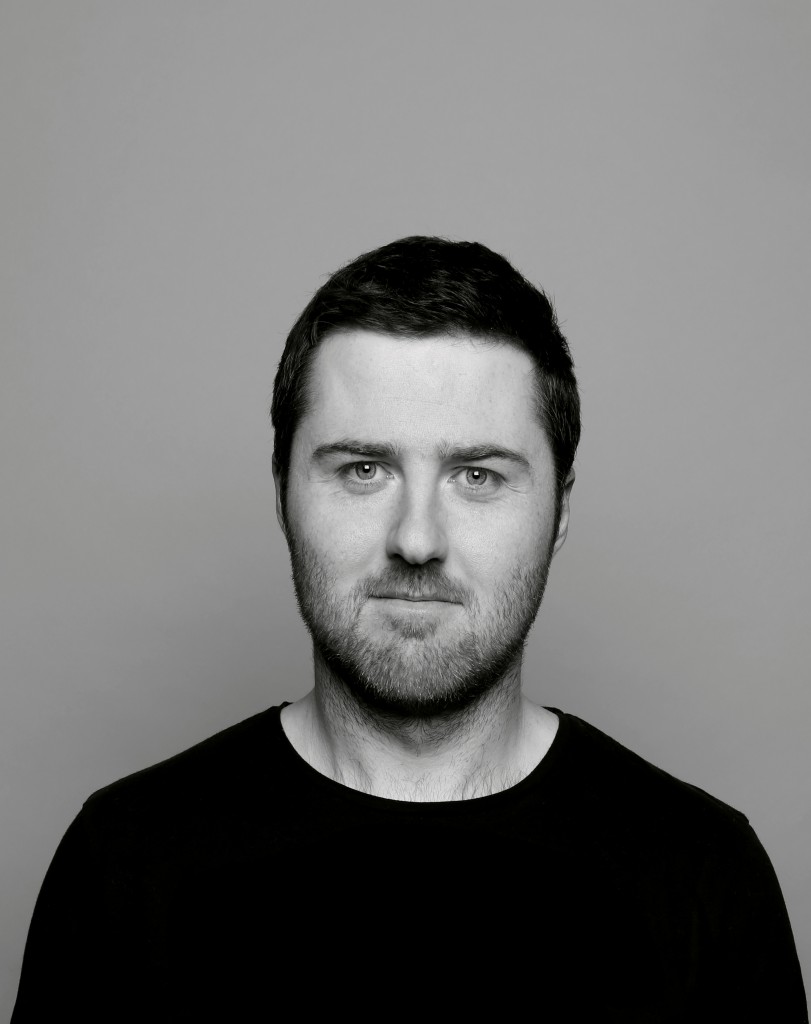
© Andy Hollingworth
Known by many as Rhod Gilbert’s trusty sidekick, both on the 2010 television panel show Ask Rhod Gilbert (as well as other projects including Gilbert’s pilot sitcom Back To Llanbobl, which is expected to air this Autumn), and in recent years as tour support, Lloyd Langford is a comic of extensive television and stand up experience, and this shines through consistently in a preview of his latest show Rascal, performed at MAC in Birmingham.
Langford takes to the stage with his trademark droll delivery and slouched posture. His new show primarily considers the perils of relationships in the 21st century society, with the comic self-proclaiming it to potentially be his rudest hour of stand up thus far. Lloyd takes delight in saying what everyone else is thinking; not afraid to push an idea slightly too far or make his listeners feel slightly uncomfortable, particularly regarding latecomers. Here we have a comedian who clearly appreciates what an audience want from a live comedy experience. Lloyd’s off-the-cuff remarks are pleasingly quick and he segways between audience interaction and material smoothly, despite the fact he is performing an unpolished show.
Developing ideas based on life experiences over the past year, with topical references scattered throughout, it is somewhat difficult to tell whether this comic is being truly open with his audience or not. Langford’s material makes him appear quite solitary at times; yes, there are mentions of past girlfriends here and there, and talk of a cruise with his parents and brother, but the majority of the show centres around Lloyd’s own private musings, triggered by his experiences while travelling with work (perhaps fitting with the view that stand up comedy is one of the loneliest careers).
Lloyd Langford epitomises a no-messing-about, does-what-it-says-on-the-tin kind of comedy. He conveys an attitude that is both underwhelmed and apathetic, yet also irritated by the many obstacles that modern life presents, from hotels, to the weather, to terrorism (those “proper ne’er-do-wells, scamps, bad eggs”). But beneath the silliness, an anger certainly bubbles under the surface of Langford’s comedy, reminiscent of fellow Welshman Rhod Gilbert. This new show, however, does not see any of that frustration overflow; Langford remains in control. Instead, he is gleefully childish, sometimes bordering on pedantic, happy to play devil’s advocate through his cynicism and judgements, bringing out the naughty child that hides within each of us.
Lloyd Langford will be performing his show Rascal at the Edinburgh Festival.
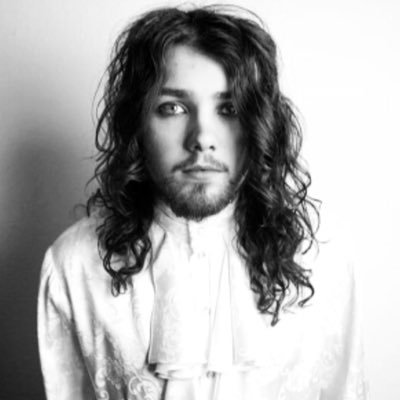 Joseph Lynn is a photographer and filmmaker, perhaps most widely known for his work on Noel Fielding’s recent tour, An Evening With Noel Fielding, where he created a behind the scenes documentary following Noel, fellow cast members Tom Meeten and Mike Fielding and the rest of the crew as they embarked on their nationwide tour. He also produced a photography series entitled All Work No Play to document the tour and is currently working on a documentary entitled Soho George.
Joseph Lynn is a photographer and filmmaker, perhaps most widely known for his work on Noel Fielding’s recent tour, An Evening With Noel Fielding, where he created a behind the scenes documentary following Noel, fellow cast members Tom Meeten and Mike Fielding and the rest of the crew as they embarked on their nationwide tour. He also produced a photography series entitled All Work No Play to document the tour and is currently working on a documentary entitled Soho George.What originally attracted you to photography as a means of creative expression?
It happened slowly and without that much consciousness. I always knew I was interested in film, but photography always seemed really complicated to me; very equipment based and intricate to get a good shot I thought. When touring with Noel I was asked to start taking photos for press release and so I had to teach myself on the road. Luckily I had 40 shows in which to practice and so I got to experiment with every different angle possible. Photos can convey an atmosphere, create a mood or capture a memory. It’s a pretty powerful tool.
What aspect of your work is currently most exciting for you?
The variety of it. I’m not entirely sure what it is I do yet. I’ve only just graduated from University and I’m open to any possibility. I like that I don’t have to commit to one profession yet. I’m working on a film, a documentary, another exhibition, and general photography work. All of those things may or may not come to anything but it’s exciting to see what emerges. The project I’m working on at the moment is a short documentary about a man who has lived in Soho all his life. Hopefully that will come out before the end of the year.
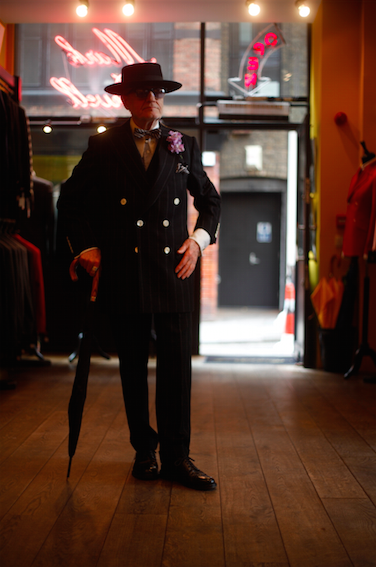
Soho George
What was the most difficult aspect of your All Work No Play project?
What not to keep in. I have so many pictures spanning the last few years, so knowing what to inevitably cut or keep was difficult. Also I basically had to start a little business, printing and framing, it was a big task. Was really fun to work physically with your photos though; changes them completely.
What is your role in the production of Brakes?
I became friends with Mercedes Grower (the writer/director) when I moved to London 4 years ago. Since then I started as an assistant, then a camera operator, an editors assistant, and an associate producer. It’s such a lovely project where everyone has had to pull together to get it done.
What would make your career a success, in your own eyes?
Just being able to earn a living off something I enjoy doing. I don’t really have huge aspirations for big budget feature films or wide success. I essentially want the freedom to work with people I’m interested in, and on projects I’m excited about. If I get to do that and afford to pay my way in life I’ll be a happy man.
FOLLOW JOE LYNN ON TWITTER TO HEAR ABOUT HIS UPCOMING DOCUMENTARY ‘SOHO GEORGE’ FIRST
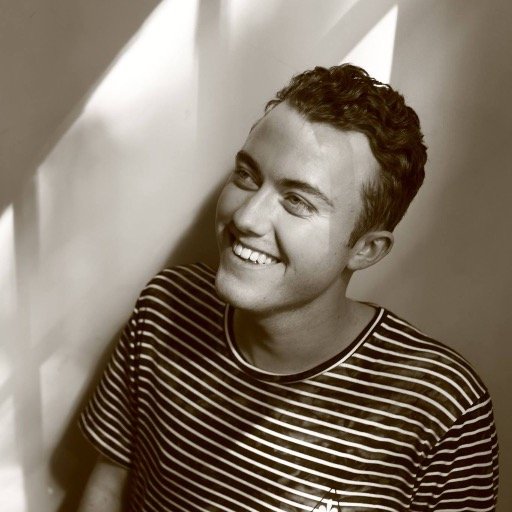
Tom Lucy
Guildford-born stand up comedian Tom Lucy is only nineteen years old and has already supported the likes of Harry Hill, Simon Amstell and Russell Howard on tour. Upon walking on stage, Lucy has expressed that the first thing on his agenda is often to address his young age: “It’s almost like having a physical disability or something; you have to mention it as soon as you get on stage, or it makes people nervous.” He’s not apologetic for being so young, though, and at no point does Tom make any attempt to spout advice to those who have lived longer than him; there is, somewhat refreshingly, no sense of self-entitlement to be seen.
It’s worth questioning, then, whether being young in the comedy industry is something that serves to benefit a performer (this draws a neat parallel with MoodyComedy, with the site first coming into existence when I was fifteen; it is very much a case of trial and error, and learning as we go along). It seems that Tom has been able to use his apparent innocence to his advantage, with his cool-headed demeanour on stage giving the impression of experience way beyond his years. Any nerves are cleverly concealed, masked by an array of quirky mannerisms that he may not even be aware that he is doing. His material is honest and relatable, often covering issues relating to puberty and relationships, though Lucy still manages to appeal to an older audience as well. Unsurprising, then, that he has recently been crowned Leicester Mercury Comedian of the Year.
For more information, visit Tom Lucy’s website and follow him on Twitter.
What is your favourite project to have ever worked on?
It’s probably whatever I happen to be currently working on. Otherwise getting through the long and lonely days would be unbearable.
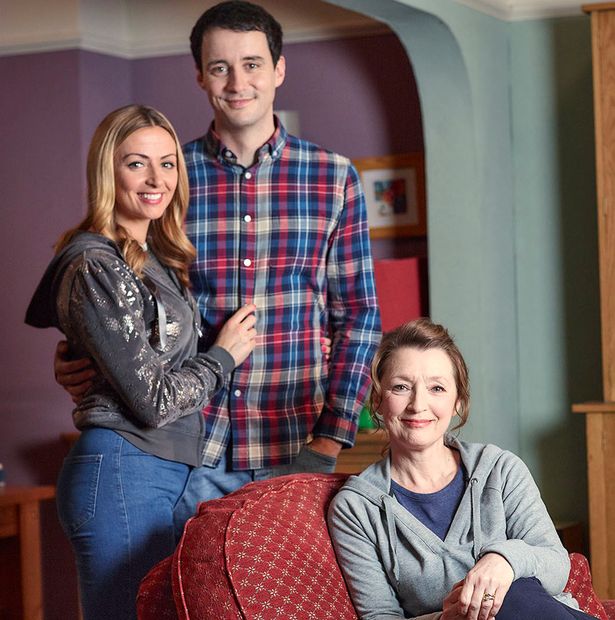
Mum, BBC2
Did you achieve everything that you wanted to achieve with Mum?
There are so many things that can go wrong in making a TV show. You constantly bang up against the limits of your own talent and the schedule. There are always things I’d like to have written differently. There are always things we had to sacrifice in the chaos of shooting. There are always things I did in the edit that I wish I could go back and unpick. But the actors and the team were extraordinary and I wanted to make a show that was truthful, warm, funny and moving, that spoke about what it’s actually like to be a person, and people seemed to appreciate that, so I’m pleased.
What is the most rewarding aspect of your job?
I like the act of writing. I like working with other people to make it better. I like the edit. I hate it when it goes out. The best thing is probably when people tell me my work made them happy. That’s why we all slave our guts out. So it’s lovely to hear it was worth it.
How would you advise young writers to get started?
Write all week. Take weekends off. Read things you didn’t know you were interested in. Learn to take criticism not personally but as a necessary step to improving your work for the good of others. You shouldn’t expect things to take off immediately, nor should you want them to. You need time to learn your craft, what it is you do and why it is you do it like that. Get your writing in front of audiences and learn from them. They’re usually right. Remember your work shouldn’t be a way of making yourself appear cool or clever or interesting. Its root purpose is the entertainment of others. They’re the ones who are paying for you to have a pretty special life. And remember that in writing there is no such thing as finished.
What is your next writing project?
A second series of Mum. More theatre.
FOR MORE INFORMATION ABOUT PAST AND FUTURE PROJECTS, VISIT STEFAN GOLASZEWSKI’S WEBSITE
Creator of the long-spanning BBC3 sitcom Him & Her, Stefan Golaszewski, has been channelling his writing into a new six-part bittersweet comedy, Mum. The narrative follows recently widowed Cathy as she copes (rather admirably) with the loss of her husband and the addition of a new member of the family; son Jason’s new girlfriend Kelly, who is ditsy and initially very peculiar; seeming, if only at first, to stand in stark contrast to the rest of the family.
Mum is a comedy of frustrations and miscommunication. There are backstories to consider, such as poor Kelly’s dysfunctional, perhaps even bordering on abusive, relationship with her mother. Golaszewski utilises these subtleties to consider the boundary between indecency and secrecy, frequently flirting with the idea of blurring the line between the two, forcing viewers to acknowledge their own instinctive desire to pigeon-hole characters into tropes. And there is an undeniable warmth to the narrative and these character relationships, with the constant competing of noises proposing a nostalgic element for those who grew up as part of a big family.
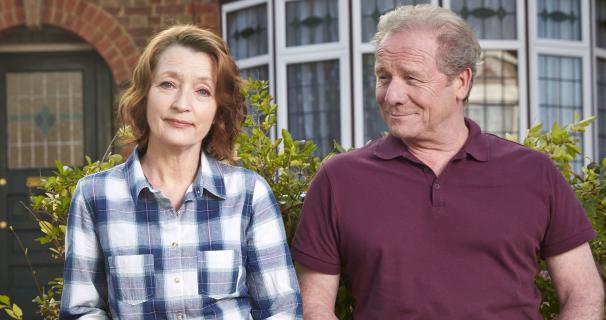
Lesley Manville and Peter Mullan © BBC2
Upon first viewing, some elements of the narrative may seem to be cliché, with the younger characters being highlighted as rather dense and materialistic. However, this softens as the series progresses and Jason and Kelly begin to make important life decisions, such as making plans to move to Australia. It is important to note that these personalities are not the problematic ones within the family dynamic. The bitter characters, though often overbearing in their brashness, serve as an interesting contrast against the virtuous ones, including hero of the hour Michael, played by Peter Mullan. This alludes to the notion of intentions conflicting with behaviours, with those who might be forgiven for struggling actually doing quite the opposite and those who seem put-together threatening to fall apart (note the crumbling marriage of Pauline and Derek).
Any potential over-exaggeration of antagonistic characters, Dorothy Atkinson’s Pauline in particular, is rescued by the subtlety of writing for our protagonist, Cathy. Lesley Manville shines in this production, with Cathy providing delightfully unexpected sarcasm and dark humour in moments of tension. Manville and Mullan make a tantalising onscreen pair and the potential for their friendship to blossom as each begins to move on from their past relationship is sweetly and realistically developed. This comedy is an exploration of a variety of humanity’s biggest fears, spanning from bereavement and loneliness to relationships and family values. Humble and sympathetic, Mum presents a narrative that has plenty of scope to flourish within a second series.
Written by Ben Elton (of The Young Ones and Blackadder fame), Upstart Crow is a BBC Two sitcom about the life and works of William Shakespeare, as part of the channel’s commemoration of the Bard’s 400th birthday. The cast is diverse and exciting, ranging from television-screen veterans David Mitchell, Liza Tarbuck and Harry Enfield, to stand up comedians Rob Rouse, Gemma Whelan and Spencer Jones, topped off with Helen Monks (Raised By Wolves), Mark Heap (Friday Night Dinner, Green Wing) and Dominic Coleman (Miranda). From the outset, viewers feel as though they can trust this cast.
David Mitchell’s portrayal of Shakespeare is a refreshing role change for the comedian. He plays a disrespected and under-appreciated playwright, whose work is openly criticised as being confusing, superfluous and grandiose (the bard himself having being famously labelled by the dramatist Robert Greene as an “upstart crow”, in effect, a boastful scavenger).
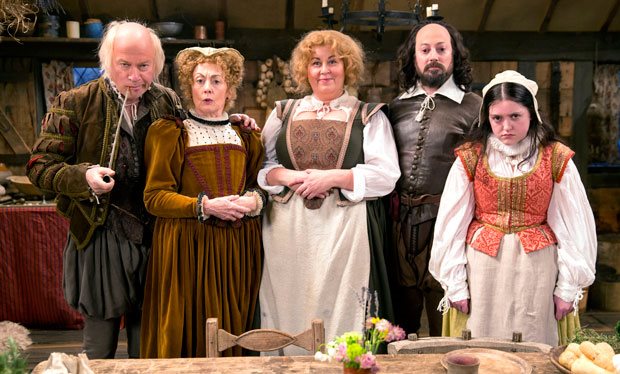
© BBC
Many of the moments of laughter in Upstart Crow come from miscommunication, with Mitchell’s depiction of Shakespeare having an extra hurdle to negotiate as no other characters seem to be able to make head nor tale of his rhetoric. For those of us having briefly studied the playwright at school, we are frequently permitted the smug satisfaction of being able to appreciate a reference; something we were no doubt unable to do whilst actually studying. In this way, Shakespeare’s works are made accessible for an audience of all ages, humorously slammed by less-appreciative characters almost before Will has managed to utter beginnings of a metaphor.
The satirical misogyny is in abundance, highlighting the ridiculous nature of inequality spanning way back to the 16th century. Rob Rouse’s character, Shakespeare’s servant Bottom, is particularly moronic in his sexism (along with Kit Marlowe, played by Tim Downie; “A clever girl’s an ugly girl, Kate,”); stupid in such a way that is almost refreshing, as for once the female character is sympathised with by a modern audience. Predictable in places, perhaps, but the ridiculous nature of some of these plot lines is arguably in the same vein as of the bard’s own greatest comedies. It may be a push to label Upstart Crow an informative piece of television, but it certainly encourages further research. The life and works of Shakespeare are fondly ridiculed, with the satire skirting lightly on the border of cynicism. Here we have a modern twist on a widely-known historical figure that encourages a greater understanding of the wider context of Shakespearean Britain, and is already set to return for a second series.